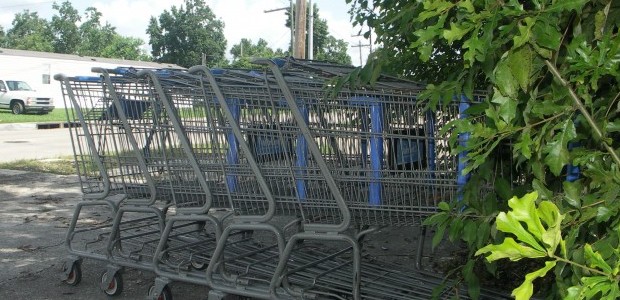Study to deepen Port Fourchon approved
August 1, 2012
Patterson steps up economic push
August 1, 2012Attempts to address shopping cart blight will make another round in the process that government officials contend is needed to resolve a health, safety and quality of life issue.
Terrebonne Parish Council members accepted a veto by Terrebonne Parish President Michel Claudet last Wednesday and will attempt to put wheels on a new resolution designed to eliminate abandoned shopping carts from roadsides, ditches, canals and bayous.
Drafted by Councilman John Navy, an initial proposal would have required retailers to place permanent identification plates on shopping carts. Merchants would also have been held responsible for retrieving carts taken from their parking lots.
An original draft of the ordinance included fining businesses for carts found off property, but that line was removed prior to passage on July 11.
Claudet agreed a solution needs to be reached in dealing with abandoned shopping carts, and explained that his veto came because he views the merchants as victims, not perpetrators.
“I feel the ordinance does not address the offender who removed the shopping cart from the lawful premises, but penalizes the retailer who did nothing to cause the shopping cart removal,” Claudet said.
Navy, who noted a high number of carts abandoned in Dist. 1, which he represents, said he drafted his proposal after a similar law in Jefferson Parish.
“The thing is, this is modeled after an ordinance that has existed for years,” Navy said. “Jefferson [Parish] actually got an environmental quality award because it cleans up the community and addresses the blight issue. No one intended to fine the community. We only attempted to take on an ordinance that exists in another parish.”
Shopping cart control and laws intended to keep the units on given businesses’ property do not come easy, according to Brian Osterfeld, vice president of sales and marketing with Gatekeeper Systems.
Based in Irvine, Calif., Gatekeeper Systems is an international retail loss prevention firm, which has helped retailers with shopping cart containment, including locking wheel devices and monitoring tools.
“It is hard to define the actual volume of stolen carts,” Osterfeld said. He said misplaced carts are noticed mostly in cities where ordinances exist and are enforced. The problem, he added, is identifying responsible parties.
“Almost every state has a law saying … ‘it is illegal to take a shopping cart off premises even though it is there for your use,’” Osterfeld said.
The loss prevention expert said some communities charge fines of up to $25 to people taking shopping carts off a merchant’s property. “How are you going to collect a fine against a homeless person?” he said. “There is no way.” He also confirmed the property owner where a loose cart is found might not be associated with the person that took the unit, making proof of responsibility difficult.
Osterfeld said ordinances in some communities require businesses to put telephone numbers on shopping carts. Once the cart is picked up by government crews the business is called and has 24 hours to retrieve it or be fined. “We have heard from some cities that get paid up to $250,000 annually to collect carts,” he said.
Walmart spokeswoman Kayla Whaling said the company has designated parking lot attendants that have the responsibility of returning carts to store entrances from designated racks and making sure shopping carts are not removed from the company’s property. When carts are removed, she said, lot attendants are to retrieve them.
“We offer carts for the convenience of our customers,” Whaling said. “While we don’t encourage [customers] to leave with them, the reality is that it does sometimes happen. We have a diligent team of associates that retrieves carts on an as-needed basis.”
Whaling said if residents see abandoned Walmart shopping carts, they shoul call the nearest store, then crews will retrieve the carts. She suggested retailers consider the model of an unidentified Walmart location that has a designated day to recover shopping carts from its surrounding neighborhood. “They are being proactive as far as retrieving carts,” she said.
Placing accountability for costs associated with recovering abandoned shopping carts is not easy, according to all persons addressing the issue.
“The taxpayer is not creating the problem,” Osterfeld said. “It tends to be other people. The retailer says, ’Hey, it’s not our fault if you would just enforce the laws.’ The [communities] not fining retailers seem to work pretty well. I understand both sides.”
“If [the council and Claudet] don’t want to fine businesses, that’s fine,” Navy said. “The only intent I had was to clean up the community.”
Because the council declined to override the shopping cart ordinance veto, it has until Aug. 8 to present and vote on an alternative resolution.
Navy said he will be working closely with legal counsel Courtney Alcock to draft a new shopping cart ordinance.
Abandoned shopping carts taken from stores by residents can regularly be found along East Street and other back roads in Houma. A measure that would have placed responsibility primarily on merchants has been vetoed by Terrebonne Parish President Michel Claudet because it does not address individuals taking carts from retailers.












